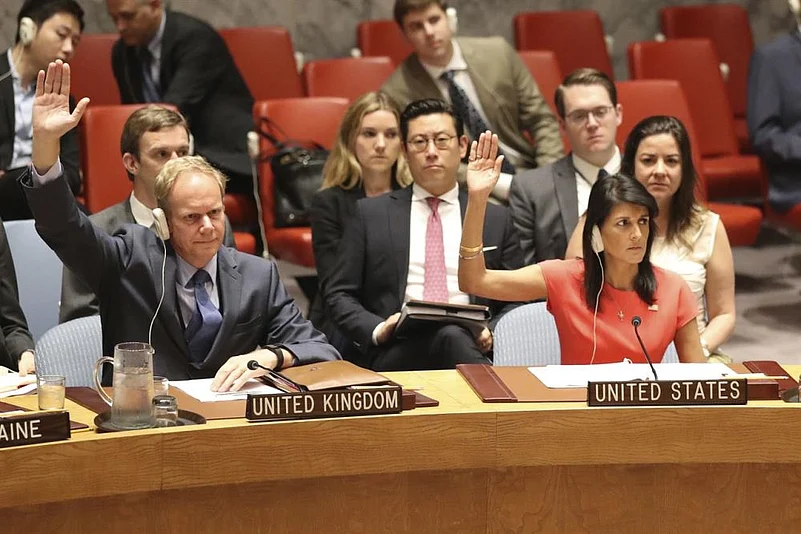The UN Security Council unanimously backed a US-drafted resolution that significantly strengthened sanctions on North Korea, with a ban on exports aimed at depriving Pyongyang of $1 billion in annual revenue.
The sweeping measures were the first of that scope to be imposed on North Korea since US President Donald Trump took office and highlighted China's willingness to punish its Pyongyang ally.
The resolution bans all exports of coal, iron and iron ore, lead and lead ore, as well as fish and seafood by the cash-starved state -- stripping North Korea of a third of its export earnings estimated at $3 billion per year.
US Ambassador Nikki Haley told the council that the stiffer measures brought the penalty imposed on North Korea for its ballistic missile tests "to a whole new level" and that the council had put leader Kim Jong-Un "on notice.
"This is the most stringent set of sanctions on any country in a generation," Haley said.
If fully implemented by China and Russia, North Korea's main economic partners, the measures would tighten the vise around Pyongyang as it seeks to develop its military programs.
The resolution also prevents North Korea from increasing the number of workers it sends abroad whose earnings are another source of revenue for Kim's regime.
It prohibits all new joint ventures with North Korea, bans new investment in the current joint companies and adds nine North Korean officials and four entities including North Korea's main foreign exchange bank to the UN sanctions blacklist.
The United States entered into negotiations with China a month ago on the new resolution after North Korea launched its first intercontinental ballistic missile on July 4 which was followed by a second test on July 28.
But the measure does not provide for cuts to oil deliveries to North Korea as initially proposed by the United States -- a move that would have dealt a serious blow to the economy.
The new raft of measures are the seventh set of UN sanctions imposed on North Korea since it first carried out a nuclear test in 2006, but these have failed to compel Pyongyang to change its behavior.
The United States has put heavy pressure on China, which accounts for 90 percent of trade with North Korea, to enforce the sanctions and the fate of these measures largely hinges on Beijing's cooperation.
China and Russia had resisted the US push, arguing that dialogue with North Korea was the way to persuade Pyongyang to halt its military programs.
Chinese Ambassador Liu Jieyi said the resolution "does not intend to cause a negative impact" to North Korea's people and stressed that it called for a return to talks on denuclearization of the Korean peninsula.
Russian Ambassador Vasily Nebenzia stressed that sanctions "cannot be an end in themselves" but rather "a tool for engaging this country in constructive talks."
Backed by its European allies, Japan and South Korea, the United States has maintained that tougher sanctions would put pressure on North Korea to come to the negotiating table.
Trump's national security advisor, Lieutenant General HR McMaster, said the United States would not tolerate the threat posed by North Korea's missile and nuclear tests.
McMaster, in the interview with MSNBC, said Trump had told China's President Xi Jinping it was no longer enough for North Korea to "freeze" its programs since it had already crossed "threshold capability" and the goal was now denuclearization.
As negotiations at the United Nations entered the final stretch, US Secretary of State Rex Tillerson declared that Washington was not seeking regime change in North Korea and was willing to talk to Pyongyang.
South Korea's foreign minister, meanwhile, held out a diplomatic olive branch today, saying she was open to holding discussions with her North Korean counterpart at a security forum in the Philippines.
"If there is an opportunity that naturally occurs, we should talk," Kang Kyung-Wha told reporters as she landed in Manila today, according to South Korea's Yonhap news agency.
North Korea's top diplomat, Ri Hong-Yo, was attending the regional summit, which is hosted by the 10-member Association of Southeast Asian Nations (ASEAN).
Seoul last month proposed military talks with Pyongyang but the North refused to respond. Had they gone ahead, they would have been the first official inter-Korean talks since 2015.
(AFP)

























